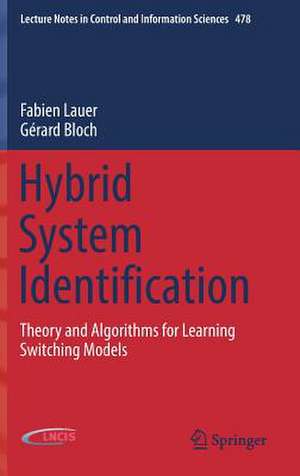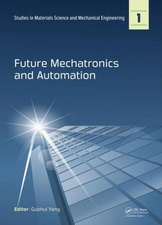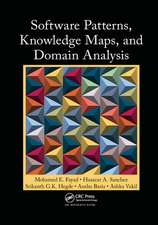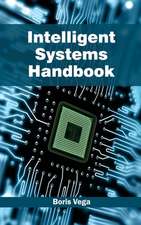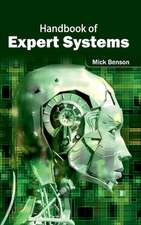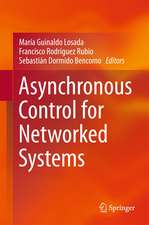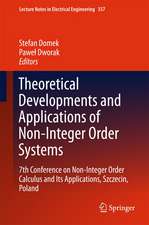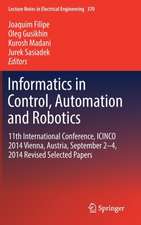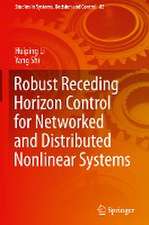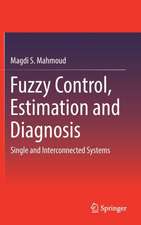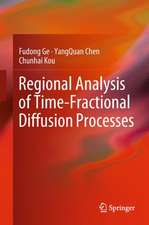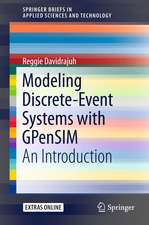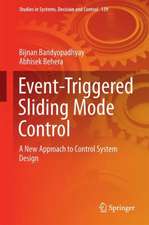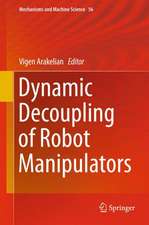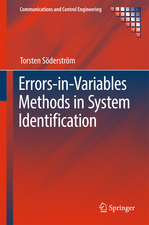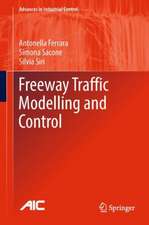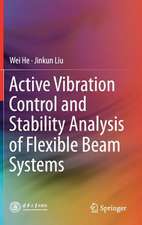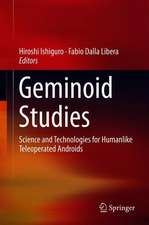Hybrid System Identification: Theory and Algorithms for Learning Switching Models: Lecture Notes in Control and Information Sciences, cartea 478
Autor Fabien Lauer, Gérard Blochen Limba Engleză Hardback – 5 oct 2018
The authors illustrate the key technical points using examples and figures to help the reader understand the material. The book includes an in-depth discussion and computational analysis of hybrid system identification problems, moving from the basic questions of the definition of hybrid systems and system identification to methods of hybrid system identification and the estimation of switched linear/affine and piecewise affine models. The authors also give an overview of the various applications of hybrid systems, discuss the connections to other fields, and describe more advanced material on recursive, state-space and nonlinear hybrid system identification.
Hybrid System Identification includes a detailed exposition of major methods, which allows researchers and practitioners to acquaint themselves rapidly with state-of-the-art tools. The book is also a sound basis for graduate and undergraduate students studying this area of control, as the presentation and form of the book provides the background and coverage necessary for a full understanding of hybrid system identification, whether the reader is initially familiar with system identification related to hybrid systems or not.
| Toate formatele și edițiile | Preț | Express |
|---|---|---|
| Paperback (1) | 889.12 lei 6-8 săpt. | |
| Springer International Publishing – 10 dec 2019 | 889.12 lei 6-8 săpt. | |
| Hardback (1) | 895.09 lei 6-8 săpt. | |
| Springer International Publishing – 5 oct 2018 | 895.09 lei 6-8 săpt. |
Din seria Lecture Notes in Control and Information Sciences
- 20%
 Preț: 318.81 lei
Preț: 318.81 lei - 15%
 Preț: 633.53 lei
Preț: 633.53 lei - 20%
 Preț: 555.04 lei
Preț: 555.04 lei - 18%
 Preț: 959.98 lei
Preț: 959.98 lei - 15%
 Preț: 696.02 lei
Preț: 696.02 lei - 18%
 Preț: 957.75 lei
Preț: 957.75 lei - 18%
 Preț: 782.42 lei
Preț: 782.42 lei - 18%
 Preț: 894.46 lei
Preț: 894.46 lei - 18%
 Preț: 1111.34 lei
Preț: 1111.34 lei - 20%
 Preț: 347.08 lei
Preț: 347.08 lei - 11%
 Preț: 468.56 lei
Preț: 468.56 lei - 20%
 Preț: 657.16 lei
Preț: 657.16 lei -
 Preț: 387.75 lei
Preț: 387.75 lei -
 Preț: 397.97 lei
Preț: 397.97 lei -
 Preț: 379.86 lei
Preț: 379.86 lei -
 Preț: 394.71 lei
Preț: 394.71 lei -
 Preț: 390.84 lei
Preț: 390.84 lei - 15%
 Preț: 642.51 lei
Preț: 642.51 lei - 15%
 Preț: 648.24 lei
Preț: 648.24 lei -
 Preț: 381.59 lei
Preț: 381.59 lei -
 Preț: 385.62 lei
Preț: 385.62 lei - 15%
 Preț: 641.53 lei
Preț: 641.53 lei - 15%
 Preț: 699.28 lei
Preț: 699.28 lei - 20%
 Preț: 333.72 lei
Preț: 333.72 lei -
 Preț: 379.68 lei
Preț: 379.68 lei -
 Preț: 484.98 lei
Preț: 484.98 lei -
 Preț: 390.63 lei
Preț: 390.63 lei -
 Preț: 423.73 lei
Preț: 423.73 lei -
 Preț: 393.13 lei
Preț: 393.13 lei -
 Preț: 382.36 lei
Preț: 382.36 lei - 18%
 Preț: 737.26 lei
Preț: 737.26 lei -
 Preț: 392.37 lei
Preț: 392.37 lei - 15%
 Preț: 645.28 lei
Preț: 645.28 lei - 15%
 Preț: 637.93 lei
Preț: 637.93 lei -
 Preț: 383.50 lei
Preț: 383.50 lei -
 Preț: 397.59 lei
Preț: 397.59 lei -
 Preț: 407.19 lei
Preț: 407.19 lei -
 Preț: 406.80 lei
Preț: 406.80 lei -
 Preț: 385.08 lei
Preț: 385.08 lei -
 Preț: 387.38 lei
Preț: 387.38 lei -
 Preț: 387.38 lei
Preț: 387.38 lei -
 Preț: 394.71 lei
Preț: 394.71 lei -
 Preț: 391.02 lei
Preț: 391.02 lei -
 Preț: 383.71 lei
Preț: 383.71 lei -
 Preț: 396.62 lei
Preț: 396.62 lei -
 Preț: 382.95 lei
Preț: 382.95 lei -
 Preț: 396.02 lei
Preț: 396.02 lei -
 Preț: 385.08 lei
Preț: 385.08 lei -
 Preț: 384.48 lei
Preț: 384.48 lei -
 Preț: 381.59 lei
Preț: 381.59 lei
Preț: 895.09 lei
Preț vechi: 1091.58 lei
-18% Nou
Puncte Express: 1343
Preț estimativ în valută:
171.28€ • 180.11$ • 141.52£
171.28€ • 180.11$ • 141.52£
Carte tipărită la comandă
Livrare economică 17 aprilie-01 mai
Preluare comenzi: 021 569.72.76
Specificații
ISBN-13: 9783030001926
ISBN-10: 303000192X
Pagini: 253
Ilustrații: XXI, 253 p. 35 illus., 34 illus. in color.
Dimensiuni: 155 x 235 x 20 mm
Greutate: 0.56 kg
Ediția:1st ed. 2019
Editura: Springer International Publishing
Colecția Springer
Seria Lecture Notes in Control and Information Sciences
Locul publicării:Cham, Switzerland
ISBN-10: 303000192X
Pagini: 253
Ilustrații: XXI, 253 p. 35 illus., 34 illus. in color.
Dimensiuni: 155 x 235 x 20 mm
Greutate: 0.56 kg
Ediția:1st ed. 2019
Editura: Springer International Publishing
Colecția Springer
Seria Lecture Notes in Control and Information Sciences
Locul publicării:Cham, Switzerland
Cuprins
Introduction.- System Identification.- Classification.- Hybrid System Identification.- Exact Methods for Hybrid System Identification.- Estimation of Switched Linear/Affine Models.- Estimation of Piecewise Affine Models.- Recursive and State-space Identification of Hybrid Systems.- Nonlinear Hybrid System Identification.
Notă biografică
Fabien Lauer obtained his Ph.D. in Control Engineering from the University Henri Poincaré Nancy 1, France, in 2008. He was then a post-doctoral fellow at the Heidelberg Collaboratory for Image Processing, Germany, and is now an Associate Professor of Computer Science at the Université de Lorraine, France, since 2009. He published 18 peer-reviewed journal papers, 2 book chapters and 17 conference papers on hybrid system identification and machine learning.
Gérard Bloch has been Associate Professor at the University Henri Poincaré Nancy 1, France, then Full Professor, at the Université de Lorraine, France, from 1991 until 2017, where he took several pedagogical or administrative positions. He coauthored one book and one book chapter, published 35 peer-reviewed journal papers, and 65 conference papers on system identification, machine learning and intelligent control applications.
Textul de pe ultima copertă
Hybrid System Identification helps readers to build mathematical models of dynamical systems switching between different operating modes, from their experimental observations. It provides an overview of the interaction between system identification, machine learning and pattern recognition fields in explaining and analysing hybrid system identification. It emphasises the optimization and computational complexity issues that lie at the core of the problems considered and sets them aside from standard system identification problems. The book presents practical methods that leverage this complexity, as well as a broad view of state-of-the-art machine learning methods.
The authors illustrate the key technical points using examples and figures to help the reader understand the material. The book includes an in-depth discussion and computational analysis of hybrid system identification problems, moving from the basic questions of the definition of hybrid systems and system identification to methods of hybrid system identification and the estimation of switched linear/affine and piecewise affine models. The authors also give an overview of the various applications of hybrid systems, discuss the connections to other fields, and describe more advanced material on recursive, state-space and nonlinear hybrid system identification.
The authors illustrate the key technical points using examples and figures to help the reader understand the material. The book includes an in-depth discussion and computational analysis of hybrid system identification problems, moving from the basic questions of the definition of hybrid systems and system identification to methods of hybrid system identification and the estimation of switched linear/affine and piecewise affine models. The authors also give an overview of the various applications of hybrid systems, discuss the connections to other fields, and describe more advanced material on recursive, state-space and nonlinear hybrid system identification.
Hybrid System Identification includes a detailed exposition of major methods, which allows researchers and practitioners to acquaint themselves rapidly with state-of-the-art tools. The book is also a sound basis for graduate and undergraduate students studying this area of control, as the presentation and form of the book provides the background and coverage necessary for a full understanding of hybrid system identification, whether the reader is initially familiar with system identification related to hybrid systems or not.
Caracteristici
Provides a self-contained and comprehensive treatment on hybrid system identification Presents readers with a broad view and introduction to state-of-the-art machine learning methods Includes a detailed exposition of all major methods
